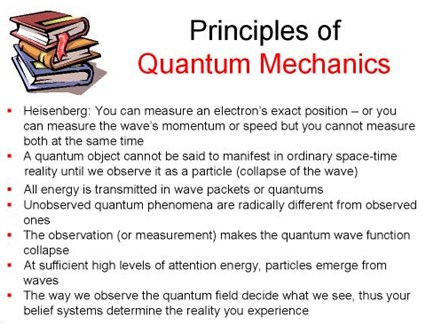


I recently gave a talk on Quantum Physics at my local astronomy club (the South Peninsula Astronomy Club in Fish Hoek) and in doing so I realized how unaware the average person is about the way the universe works. Our perception of the world is based on our experiences in everyday life - walking in the street, driving a car, playing football and so on. But these experiences are an extremely limited subset of reality, where events happen at low speeds and the objects that interact (such as humans, cars and footballs) are of moderate size and aren't very heavy.
But most of the universe isn't like this at all. Out in space there are objects of extreme size and mass (meaning with extreme gravity) moving at extreme speeds, and everywhere (even on planet Earth) matter comprises sub-atomic particles that behave nothing like a football when it is kicked.
Depending on which extreme you're interested in, there are two versions of reality to choose from:
| * | Relativity describes the behaviour of objects moving at extreme speed, or objects under the influence of extreme gravity, or both; |
| * | Quantum Mechanics describes the behaviour of microscopically-sized objects such as atoms, protons or electrons. |
These two theories were developed simultaneously in the early years of the 20'th century and caused a major upheaval in the world of Science - almost everything that we thought we knew was shown either to be wrong or at best a rough approximation of reality. Isaac Newton's ideas about space, time, gravity and motion, which had been taken as the absolute gospel truth for well over two hundred years, were overturned. From being a fairly simple, logical place, the universe suddenly became extremely complex, difficult to understand and, perhaps worst of all, unpredictable.

Relativity and Quantum Mechanics have almost nothing in common, but in one respect they are the same : both theories defy intuition and common sense. The universe does NOT behave in a logical, ordered fashion, common sense will NOT give you the right answer and your intuition WILL be wrong. So straight away I hear you ask "Well, how do we know that this stuff is correct?" Simple really - over the past hundred years, both Relativity and Quantum Mechanics have been subjected to the most rigourous scientific testing possible, and in every case their predictions have been verified to an extraordinary degree of accuracy. The weird and "spooky" effects of quantum theory have been observed many times in ever more sophisticated experiments, and the same applies to the brain-bending notions predicted by relativity such as time dilation and length contraction.
Relativity is very difficult for researchers to investigate because it only becomes noticeable at extremes that never occur on planet Earth and which cannot easily be created in a laboratory. But quantum mechanics can be observed all around us, every day and in everything we do. Intrigued? Well, here are a few of the weird effects of Quantum Mechanics:
Wave-Particle Duality. It seems that all particles (such as electrons or protons) have wave-like properties, and all waves (such as light or x-rays) have particle-like properties. Depending on what experiment you conduct, you'll get results consistent with one or the other. Amazingly, even relatively massive objects like humans and footballs have wave-like properties, but they are vanishingly small at such high energies.
Multiple Realities. The microscopic world exists in a state of probability ; nothing is certain until it is measured, at which point all the possible states (represented by the quantum wave function of the system) "collapse" into a single actual state. These multiple possible realities are called Superpositions.
Quantum Entanglement. "Twin" particles can be created that have opposite values for the same property (eg. the "spin" of an electron, "polarization" of a photon). By changing the property of one particle, the same property of the other particle will simultaneously change. This happens no matter how far apart the two particles are – even if they are separated by distances that prevent any possible communication between them.
The above are real effects, proven to exist by multiple researchers in many different experiments. Still not convinced? Then let the last word on the subject go to Niels Bohr, a Danish physicist who was considered to be the "father" of Quantum Physics. He once said
Anybody who is not shocked by Quantum Mechanics has not understood it
 © Paul Kilfoil, Cape Town, South Africa
© Paul Kilfoil, Cape Town, South Africa